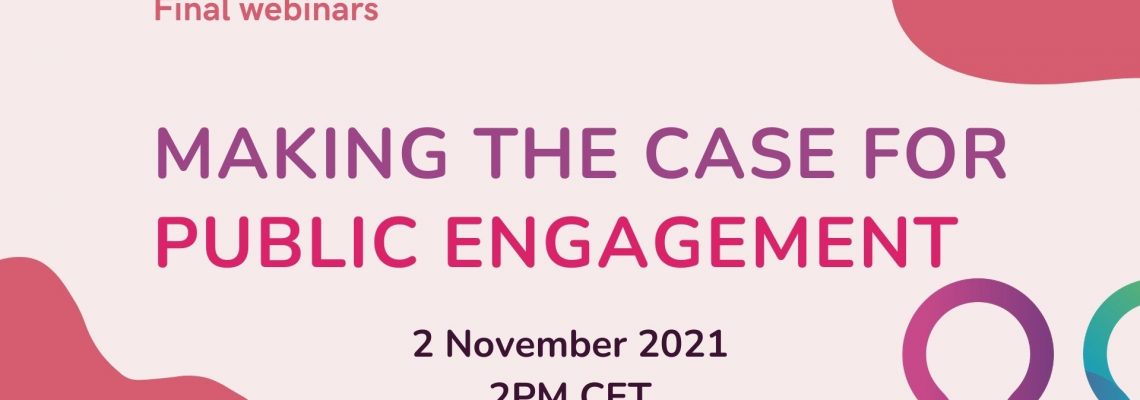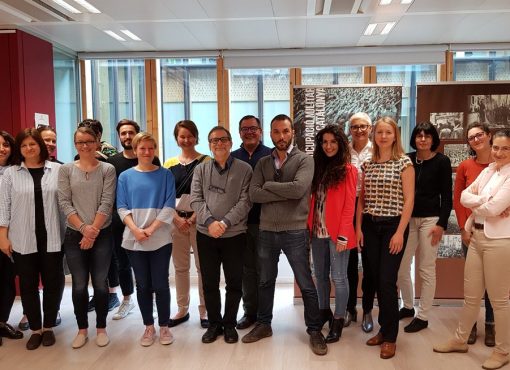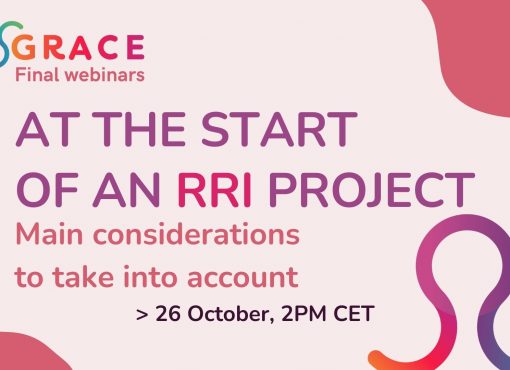
Making the case for Public Engagement
Public engagement is a foundational key of Responsible Research and Innovation (RRI), having a crucial role to play in the establishment of bonds between science and society based on trust, two-way dialogue, and long-term thinking. It asks for commitment from a variety of actors, such as the public who is invited to participate, researchers who open up their work and challenge their research practices by involving others, and organisations which bring in public engagement in their strategic thinking and decision-making. This webinar asks how value is created and demonstrated at all these levels for a strong case for public engagement.
Resources
Presentations and examples used by our speakers
Maud Radstake, Utrecht University
- Presentation slides
- Website and documents about Public Engagement by the Centre for Science Communication and Culture: https://www.uu.nl/en/organisation/public-engagement-at-utrecht-university (under construction)
- Online magazine Close-up: https://www.uu.nl/sites/default/files/Close-up%20-%20public%20engagement%20at%20Utrecht%20University_online.pdf
- Brochure Inspiring Examples: https://www.uu.nl/sites/default/files/eng_public_engagement_interactief-compressed.pdf
- About the Public Engagement track in the UU Open Science Programme: https://www.uu.nl/en/research/open-science/tracks/public-engagement
- Report exploratory study Stakeholder Engagement: https://www.uu.nl/sites/default/files/Open%20Science%20Stakeholder%20Engagement%20-%20exploratory%20study%20report.pdf
Marzia Mazzonetto, StickyDot
- Presentation slides
- Transform project: https://www.transform-project.eu/
- MOSAIC project: https://mosaic-mission.eu/
Laurene Cheilan, Bristol University
- Presentation slides
- If you are interested in issues of inclusion and exclusion regarding public engagement, this book is great:
Dawson, E. (2019). Equity, Exclusion and Everyday Science Learning: The Experiences of Minoritised Groups. Abingdon, Oxon, New York: Routledge.
Additionally it has been made into a comics, which is a really enjoyable read, you can find it here: https://equityandeverydayscience.wordpress.com/zine/
- Two reports focusing on the UK landscape but providing great insights on the realities of PE:
- TNS-BMRB & PSI. (2015). Factors Affecting Public Engagement by Researchers: A study on behalf of a Consortium of UK public research funders., (December), 1–69. Retrieved from https://wellcome.ac.uk/sites/default/files/wtp060033_0.pdf
- Viewforth Consulting. (2019). An elephant in the room: The hidden economic value of public engagement and knowledge exchange in UK universities. Available here: http://www.viewforthconsulting.co.uk/id71.html
Useful links shared by speakers and participants
Public engagement capacity building programmes
- EU-citizen.science platform, with over 27 training resources already listed: https://eu-citizen.science/training_resources
- Useful resources and guidance on the United Kingdom’s National Coordination Centre for Public Engagement: https://www.publicengagement.ac.uk
- RRI Tools’ collection of materials: https://rri-tools.eu/search-engine/-/Search/resources#keywords=
- Fostering Action on Science Engagement Challenges, an event from the Berlin Science Week, 3 November 2021: https://berlinscienceweek.com/event/fostering-action-on-science-engagement-challenges
Equity and inclusion
- A collection of resources about equity and inclusion: https://www.ecsite.eu/activities-and-services/resources/equity-and-inclusion
- Find out more about (and join) the Community of Practice Equity@Ecsite which organises monthly calls on these topics and works on concrete tools: https://www.ecsite.eu/activities-and-services/resources/new-framework-tool-equityecsite
- Emily Dawson’s webpage: https://equityandeverydayscience.wordpress.com
Engaging the excluded, an event of Berlin Science Week, 4 November 2021: https://berlinscienceweek.com/event/engaging-the-excluded
Speakers
- Laurène Cheilan, PhD student at the School of Education, Bristol University and Co-founder of CultureInstable, United Kingdom
After working for five years in the theatre field and for another five years in science centres, Laurene Cheilan is now in her final PhD year of investigating the implementation of a public engagement culture within the Innovative Training Network (ITN) Europah, in partnership with Graphic Science and the University of Bristol.
- Marzia Mazzonetto, Co-founder and CEO Stickydot, Belgium
Marzia Mazzonetto is CEO and co-founder of Stickydot, a Brussels collective committed to pushing public engagement in science further, ensuring that all voices are included when it comes to shaping research and innovation. With a background in social science and science journalism, Marzia’s main area of expertise is developing methodologies that support multi-stakeholder engagement. She is passionate about sustainable and inclusive co-creation processes leading to social innovation and participatory policies. She is also Executive Director of BE participation, a non for-profit organisation fostering inclusive empowerment processes which enable Brussels’ citizens to be actively involved in shaping the city of the future they wish for. She coordinates the EU-funded project MOSAIC (Mission-Oriented SwafS to Advance Innovation through Co-creation).
- Dr. Maud Radstake, Utrecht University, Netherlands
Maud Radstake, PhD, is head of the Public Programs department of the Centre for Science Communication and Culture at Utrecht University, the Netherlands. The department develops and hosts public programs and activities at the interface of academia and society for a broad range of audiences, and offers training and advice to academic and support staff who (want to) do public engagement. Maud is also one of the track leaders for Public Engagement in the university’s Open Science Program. She has a master’s degree in Cultural Anthropology and a PhD in Arts and Social Sciences. Before working in Utrecht, she worked as researcher and program manager on societal research and public engagement at a national program on societal issues in relation to life sciences, and as policy advisor on patient participation in an academic hospital.
Moderators
Did you enjoy this event? Did you miss it?
This event is part of the eight final webinars the GRACE project is holding every Tuesday from 26 October to 14 December, where project partners and external experts share their findings and provide useful knowledge to implement RRI in research performing and funding organisations
For almost three years, GRACE project partners have worked towards implementing fundamental institutional change in 6 research performing and funding organisations. With an intense mutual learning programme and a co-creation environment, six expert partners have supported six other partners in developing a set of specific RRI-orientated Grounding Actions in their organisation, paving the way for further institutional change.

